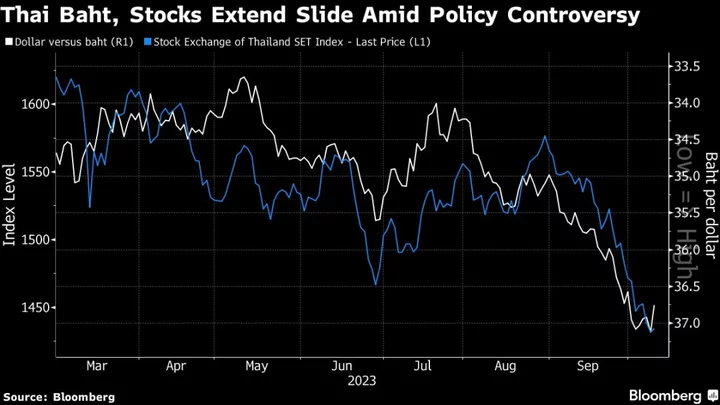Pressure is growing from financial markets for Thailand’s premier to change course on his blockbuster spending plan as concerns mount that the government will increase borrowings substantially to fund the stimulus.
Global funds have withdrawn about $1.5 billion from Thailand’s bonds and equities since September, while former central bank chiefs have joined a group calling for Srettha Thavisin’s administration to scrap a pledge to hand out 560 billion baht ($15.3 billion) in cash to residents.
Without more clarity on how Srettha, who took power on Sept. 5 as head of a coalition, will fund the spending, international investors are unlikely to return any time soon, said Somjin Sornpaisarn, the president of Thai Bond Market Association. The government is already planning to expand its budget deficit and raise borrowings by almost 8% for the current fiscal year, with the debt office reducing its sales of longer-duration bonds to allay investor concerns.
“A clearer picture of government policy and the funding program is needed to instill confidence in investors,” said Nattanont Arunyakananda, investment manager of Asian equities at abrdn Plc.
The government will reveal details of the program, including its funding source, by the end of this month.
Bank of Thailand Governor Sethaput Suthiwartnarueput has called the spending plan “inappropriate,” as he battles inflationary pressure with a quarter-point increase in interest rate for an eighth straight meeting in September. Srettha and his government have held almost daily briefings to defend the program, the main pre-election promise of his Pheu Thai Party, amid mounting criticism.
Read: S&P, Fitch Say Thailand Must Sustain Growth to Avoid Ratings Cut
The disagreement between Srettha and the central bank can lead to policy confusion “at a time when Thai GDP has yet to recover to its pre-pandemic level,” said Aninda Mitra, a macro and investment strategist at BNY Mellon Investment Management in Singapore.
Analysts have warned of further weakness in Thailand’s markets. RBC Capital Markets cut its forecast on the baht to 38.5 per dollar from 37 previously. Should the baht breach that projection, it would be the currency’s lowest level since June 2006, according to data compiled by Bloomberg.
The benchmark gauge, meanwhile, may test the 1,370 level if domestic bond yields continue to rise, according to Krungsri Securities Co. The SET Index is down more than 8% since the start of September, making it among the world’s worst performing major benchmarks during the period. It closed at 1434.45 on Tuesday.
Still, some see the selldown as a buying opportunity given that “valuations are attractive after pricing in various economic and geopolitical risks,” said Wei Li, multi asset quant solutions portfolio manager at BNP Paribas Asset Management, who remains constructive on EM Asia and Thai equities in the long term.
An eventual China stimulus could benefit the broader region, while Thailand may also get a boost from a recovery in Chinese tourism, Li added.
Srettha is hopeful that he can turn around the market gloom in the next six months, though it remains to be seen if he can convince investors to think the same.
“When people ask me what the outlook of the stock market would be, I just sigh deeply,” said Pakorn Peetathawatchai, president of the local bourse. “It’s a very tough time and sentiment is so weak.”
--With assistance from Ishika Mookerjee and Karl Lester M. Yap.

